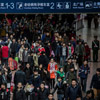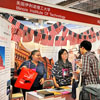���������������������������������������������
CCG持续关注国际关系议题,推动中国与全球化的发展,积极开展国际交流,充分发挥智库“二轨外交”作用,在巴黎和平论坛、达沃斯世界经济论坛、慕尼黑安全会议等重要国际政策与意见交流平台上组织分论坛、边会、圆桌会议、晚宴等活动,促进国际政商学界对话,凝聚共识;CCG积极与各国政界、智库界、工商界开展“二轨外交”活动,每年常态化赴多国调研与交流,促进中外关系攸关方互动,保持与多国政策圈层的沟通渠道。
-

【YIBADA】CCG Releases New Books, Tackles Overseas Returnees
By the end of 2015, the number of overseas returnees has already reached 2.21 million. (Photo : Getty Images)Chinese think-tank Center for China and Globalization (CCG) tackled the career prospects of overseas returnees in the country in its three newly published English books, China Radio International (CRI) reported.The release took place on Thursday at the organization’s headquarters in Chinese capital Beijing.According to data from the "White Book on Study Abroad in China," the number of overseas workers who returned to the country reached 2.21 million by the end of last year.Despite this large figure, CCG president Wang Huiyao pointed out that many of the returnees are currently "hampered by lack of working experience or higher-level skills," the article wrote.For Dr. Liu Yipeng, the writer of "Entrepreneur and Talent Management from a Global Perspective: Global Returnees," the government must learn how to establish an ecosystem where returnees can learn more about entrepreneurship and innovation.The author pointed out that one of the key incentives behind the reverse migration phenomenon is the shifting of economic gravity.Dr. Liu emphasized that beyond this picture, "those overseas immigrants will remember their home country and start moving back when opportunities come, as it’s challenging for them to integrate into local economic and social life."In this case, he added that the returnees "will not only make personal achievements in building successful careers, but also shape and contribute to the development of the Chinese society."Experts have agreed that returnees face many obstacles while starting their career in the country, including cultural matters.As a suggestion, Dr. Liu said that returnees must learn how to "change the cultural codes [and] understand the business practices and social norms in China, in order to better integrate to the cultural sensitivity or intelligence."Meanwhile, CCG vice chairman David Zweig urged the overseas returnees to take advantage of understanding both sides--that of China’s and the country where they came from.Zweig believes that by keeping in touch with their lives overseas, these migrants have the ultimate potential to "mobilize resources, information, and knowledge to cross geographic boundaries," the article noted.CCG, established back in 2008, works in the area of globalizing Chinese enterprises and talents.From YIBADA, 2016-7-9
2016年7月18日 -
张懿宸:中信资本为何要来新三板
张懿宸,中信资本控股有限公司董事长兼首席执行官,CCG常务理事 “未来的趋势,资管机构就是要管国内的钱。”中信资本控股有限公司(以下简称“中信资本控股”)董事长兼首席执行官张懿宸在接受腾讯财经《资本论》独家采访时说,这是中信资本筹划和决定在新三板挂牌的主要原因。 11月9日,全国中小企业股份转让系统(以下简称“股转公司”)的公开信息显示,中信资本已提交新三板挂牌申请,其上市主体为“中信资本股权投资(天津)股份有限公司”(以下简称“中信资本”),为中信资本控股的全资子公司。 这已经是继九鼎投资(430719)之后,登陆新三板的第九家私募股权(Private Equity,PE)投资机构。其他同业包括中科招商、同创伟业、硅谷天堂、信中利、联创永宣等等,但中信资本的出身血统和全球化运营策略,有别于其他几家。 据其官方介绍,中信资本控股有限公司成立于2002年,主营另类投资的投资管理和顾问,核心业务为直接投资、房地产基金、结构融资、资产管理及创业投资。目前旗下管理约50亿美元(约合320亿人民币)。此次中信资本控股第一次披露了股东结构:央企背景的中信股份仍是第一大股东,而腾讯和卡尔塔控股则分别为其第二大和第四大股东,中信资本管理层也持有10%的公司股权。 这家中信系企业为何要大费周章地登陆新三板?募集资金并不是主要目的,“实际上我们完全有能力从其他渠道募集资金,”张懿宸在接受腾讯财经《资本论》独家采访时说,挂牌新三板“是为了打通和国内中小机构、高净值投资人之间的渠道”。 中信资本未来将专注于三大业务,母基金、PE投资和“一带一路”基金。其中“一带一路”基金是为挖掘一带一路上的基建机会,总规模17亿美元,一期2亿美元已募集完并开始投资。 投资管理、投资收益及公允价值变动三部分是中信资本的主要收入来源。据其申请材料,2014年中信资本营业收入约1.05亿元人民币,净利润约411万元;2015年1-6月份,该公司营业收入约3180万元,净利润约77.6万元。此次注入挂牌公司的资产,包括分众传媒、顺丰控股、大众点评网、哈药集团以及环球租赁等项目。 腾讯财经《资本论》v.s. 中信资本张懿宸 腾讯财经《资本论》:中信资本为何要挂牌新三板? 张懿宸:中信资本一直管的都是美元,现在管理的50亿美元资金中有42亿美元是从境外募集的,剩下的8亿美元(约合50亿人民币)则是从境内募集的人民币。 从资产管理的角度,作为一家本土投资机构,未来的趋势一定是管国内的钱。也就是说我们以前是管国外的钱、往国内投资;将来我们则要管国内的钱、投资国内,甚至还要管国内的钱、投资海外。 要打开人民币募集的渠道,我们觉得新三板就是一个很好的选择。首先新三板上对投资人设置了一个门槛,这不是一个散户的市场,而是一个高净值和中小机构的市场。其次,投资新三板的个人和机构都知道,新三板的投资流动性是受限的,而这点恰恰更接近PE投资人。也更符合我们对投资人的诉求,我们希望投资人不是为了短线炒作,也不是认为投了中信资本旗下的挂牌公司就能短期内发大财的。基于上述方方面面的考虑,所以我们觉得值得试一下。 腾讯财经《资本论》:2012年时您还说,募集人民币基金的条件不成熟。现在看,这个环境成熟了? 张懿宸:作为一家定位“中国”的基金,中信资本的终极目标肯定是要服务于本土投资人,管美元基金是一个时期的特定产物。 基于这个考虑,所以我们几年前就开始尝试管人民币基金。目前看,中信资本是能从机构投资人那里融到钱的。我们现在管理的40亿元人民币,实际上出资人(Limited Partner,LP)从全国社保到中银投、建银投、国开行等,已经囊括了中国市场上最主要的机构投资人。 不像美国,中国市场上的机构投资人数量不足。如果我们要管更多的钱、要扩大自己在国内的投资人基础,那么就应该打通和其他类型投资人的通道。而相比于机构,人民币资金更宽、更广大的市场,是中小企业、高净值个人这类投资人。 腾讯财经《资本论》:那是否意味着挂牌新三板后,中信资本本身也会有所变化? 张懿宸:这并不是说以后我们就不管美元资产了,这块中信资本迄今还做得不错。但我们认为,管理美元资产会有天花板,一方面是能从境外募集到的美元资金规模不会有太大增长了,另一方面即使你能募集到更多的钱,要在国内投出去也并不容易。 国内的情况就不一样了。人民币投资人配置股权投资类资产的需求才刚刚兴起,远远还没有出现天花板。其次这些投资人的风险偏好也更多元化,有喜欢短期的、也有喜欢长期的,这对投资机构而言,就有尝试更多产品的可能性。 所以中信资本未来推出的产品,未来也要根据中国市场的偏好来调整,不能把美国经验简单套用过来。比如美元基金的存续周期一般来说都是10+2,但这在国内未必可行。 腾讯财经《资本论》:新三板现在的流动性并不好,挂牌公司也是良莠不齐。这时候挂牌,是个好时机么? 张懿宸:新三板目前的不足之处,都是发展中的问题。 以我们的直观感受,新三板至少非常市场化。提交材料、报批整个流程、整个机制都非常市场化、非常顺畅。同时监管要求也更接近美国,信息披露的相关的要求也很严格,但流程是清晰、透明的。 我们也希望跟着新三板一起发展。我们的想法是,新三板的监管很市场化,如果未来集合竞价这些措施能落实到位,新三板是个很好的选择。中信资本来新三板还是抱定扩大投资人基础的目的。 腾讯财经《资本论》:中信资本之前,已经有多家PE基金登陆新三板。您觉得中信资本和其他家的区别在哪里? 张懿宸:做事情更多是跟自己比,而不是跟别人比。 我们是一个做投资的机构。衡量一家投资机构,投资业绩是惟一的指标。我们来新三板,和我们的发展理念是一致的,融资之后我们还是做投资、还是做基金、还是追求投资业绩。 跟风、跟热点并不是我们的风格。可能有些时候我们会显得不那么跟得上潮流,希望中信资本吸引到的投资人也是这种性格的,不跟风、不炒作热点,而是追求一个很稳健的长期回报。文章选自腾讯财经,
2016年7月15日 -
搜房网创始人莫天全:创业路上要先行、专注和绝对领先
理事简介莫天全,搜房网公司董事长,中国与全球化智库(CCG)副主席。【编 语】 商界精英莫天全有一项鲜为人知的爱好--习武。在他看来,从商和习武有着共通之处,就算日理万机,他也要坚持练习散打、太极。现在,他创办的搜房网已成为国内排名第一的房地产家居网路平台,但他的雄心还不止于此,他的最终目标是要在中国做一个与道琼斯、麦肯锡、安德信齐名的信息咨询机构,目前的成就还只是一个开始和切入点。 “创业还靠信念,果断选择,并加强执行力度,再根据发展,一步步加入相关产业,从点做成线,最后达到面的发展模式。” ◎“‘先行’,就是你一定要比其他人提早做事情。” 莫天全自认为是一个天生“创业者”,他喜欢新鲜事物,喜欢迎接挑战,坚信创业路上要比别人先行一步。 “如果说30%的人或意见认为可以做某一件事,包括你自己也这么认为,此时我们就可能非常认真地思考,赶紧采取行动,付诸实施。如果50%的人说这个事情可以做,我们还可能去做,但要更快地去做。如果60%甚至70%的人都说这个事情可以做,那时我们就不能再做了。简言之,我们一定要去做创新的东西、别人没做过的东西。这是把握机会的一个重要方面。”莫天全如是说。 从道琼斯回国后,他开始运营国内第一套房地产指数系统。当时,若只卖信息和数据库,很难做大一个公司,于是他抓住互联网兴起的机会,把公司业务嫁接到互联网平台上来,把传统公司转化成互联网公司,带领搜房网走上一条康庄大道。“我们一定要先行,即要有先发优势,我们的创业和运营队伍对此都有非常重要的体会。” 现在看来,莫天全当初无疑做了一个正确无比的决定,不过当时这个判断却蕴含了极大的风险。是时互联网出现尚不久,机会虽然大,但行业并不成熟,倒闭的互联网公司也不在少数。在当时的环境下,莫天全表现出胆量和远见,看准互联网的光明和宽广的未来,为公司的发展确立了正确的前进方向。 ◎“我们一辈子并不要做太多的事情,能做好一两件事情就好了。” 莫天全曾讲过,从毕业到工作创业,会有一个思想变化过程,刚开始觉得世界是我们的,后来发现世界不是我们的,仅仅有做大事的宽广胸怀是不够的,还需要踏实专注地去行动,去做事,实际上一辈子能做好一两件事情就已经很优秀了。“我们要专注才可以做好一件事情,如果整天只是出点子而不做事,就有可能一事无成。所以,我们要记住,在做事情的过程中一定要专注。” 结合自身的创业经历,莫天全认为搜房网的成功与秉持专注精神、扎根房地产市场密切相关。“我们有一句口号,叫‘Everything Home Online’,即所有与‘家’有关的行业我们都要涉足,包括现在搜房上的装饰装修和建材领域,也是跟‘家’相关的产业。”目前,随着环境变化,搜房网也做出一些转型,但莫天全强调,“转型始终没有离开原始的方向,虽然具体策略和方向一直在改变,但目标和中心却始终不变,围绕着家和房子,始终没有脱离最初的目标。” 莫天全认为,创业过程中最看重的是坚持早已认定的方向,忌讳新想法太多,经常改变主意和创业方向,摇摆不定,不断做出新选择,最后反而会一事无成,一无所获。“从1999年创办搜房到现在,七年了,总的方向和原来预计的差不多,我们一直坚持着自己的路子走下来。”事实上,莫天全也被媒体认为是国内互联网界里一直坚定不移的极少数人之一。 ◎“做事情要做到一定的地位,做绝对的领头羊。” 创业应以“在本领域内做到第一”为目标,因为“这个领域内,一个企业或一个网络媒体只能做老大,做老大很舒服,做老二则很辛苦,至于老三是基本不存在的”,莫天全甚至用极端的声音来表明立场,“我们做事情要做到一定的地位,做企业要做到垄断。我们做绝对的领头羊,最好后面连羊都没有,所以要做到绝对的典型。我常常对公司里的同事说,你一定不要有竞争对手,一定不要让对手长大。你要做强,做到只有你一家。” 这听起来的确是一个豪情万丈的宣言,可以作为创业者创的目标。不过,同样值得注意的是,成为领头羊仅是一个结果,做到这点需要持之以恒,需要坚持和耐力。莫天全认为自己能在创业路上走到今天,将搜房网做到业界第一,依靠的正是永不言弃的精神,这对很多人而言是很难做到的,“在早期创业、守业过程中,你会遇到意想不到的困难,没想过就此放弃,我们要永不言弃,这是我在工作和创业当中的一个深刻感受”。本文选自《世界这么大,我们创业吧》,主编:苗绿、王辉耀,中央编译出版社中国人才50人论坛简介
2016年7月15日 -
为海归创业者提供出彩舞台
理事简介陈宁,深圳云天励飞技术有限公司创始人兼首席执行官、中国与全球化智库(CCG)常务理事。 最近一段时间,采访了不少海归创业者,他们的故事萦绕脑海,激荡起时代的跫音和澎湃的思绪。 犹记得初次探访北京市留学人员海淀创业园的情景。很难想象,在北五环外一栋不起眼的灰色小楼里,“60后”创业者陆凡和他的同事们,打造了一个世界先进的“增强现实”(AR)实验室。人到中年的陆凡,对于前沿技术仍保持着高度的敏感和热情,坚持走“技术创业”的道路,希望用技术使人们的生活更加美好。 犹记得“70后”的陈宁讲述他为何回国时,语气里那份未被岁月冲淡的激动。2009年,陈宁第一次走进深圳中兴通讯的大楼,看到那么多年轻的工程师,朝气蓬勃而又求知若渴,好像“早上八九点钟的太阳”。他相信这批人中,一定会涌现出卓越的技术人才;也相信这片热土上,一定能实现自己的创业梦想。 6年的时间,让刘若鹏从一个在地下车库里做实验的“80后”海归博士,成长为一家上市公司的董事会主席。他一手打造的“光启系”创新集团,横跨5大洲12个国家和地区,致力于凝聚全球的创新者共同为改变世界而奋斗。 一个又一个有关梦想和创业的故事,在当代中国的舞台不断上演。海归创业者用他们的才华与汗水,书写着个人成功与时代发展交相辉映的华章。 也许,身在海外,更容易为祖国的快速发展感到震撼。当中国的高铁风驰电掣、延伸到海外,当欧美街头的年轻人用着中国制造的智能手机,当越来越多的中国企业走出国门,在全球竞争中成为行业翘楚,这些情系故土的海外游子,在油然升腾起民族自豪感的同时,也清晰地看到了祖国发展所带来的巨大机遇。 “与其在国外心痒痒,不如早点回来干一番事业。”陈宁的一句话,道出了众多海归创业者的心声。在国外,或许可以过上安逸富足的生活,而回国却能拥有无限的机遇和可能性。 然而,创业绝不是一帆风顺的童话,失败的几率往往比成功更大。海归人才可能会面临“水土不服”的风险,国内市场环境的不成熟、不完善也会为本来就不平坦的创业之路增加更多挑战。对于海归创业者来说,除了满腔热情和过硬的本领,他们还需要政策的鼓励、资本的支持,需要专业机构的引导和帮助,更需要宽容失败、允许试错的社会环境。 一个好的时代,必然让人有追逐梦想的勇气,为人们提供人生出彩的舞台。我们欣喜地看到,自由、开放的创业氛围正在加速形成,越来越多的优秀人才带着海外的先进技术和经验回到中国,开始自己的创业追梦之旅。 “海阔凭鱼跃,天高任鸟飞。”广阔的中国市场为创业者提供了巨大的潜力空间,近年来兴起的“大众创业、万众创新”热潮更是为经济转型升级积蓄能量。海归创业者在时代的舞台尽展风采,而他们追逐梦想的脚步,也将为中华民族伟大复兴的事业带来不竭的动力!文章选自《人民日报海外版》,2016年7月12日
2016年7月15日 -

【China. Org】S. China Sea arbitration: A US-led conspiracy behind the farce
File photo of South China Sea. [Photo/Xinhua]Since U.S. President Barack Obama took office, "Pivot to Asia" has become one of Washington’s political pursuits and military strategies. The disputes between China and the Philippines over the South China Sea, which was provoked by former Philippine President Aquino III, came just in time as it offered Washington a good excuse and easy approach to return to the region.In January 2013, the Philippines unilaterally initiated arbitral proceedings on the South China Sea issue. To circumvent the law, it secretly changed relative concepts, deliberately separated the Nansha Islands, and asked the tribunal to issue an award over the legal status and maritime claims of some of the islands and reefs that belong to the Nansha Islands as a whole.What Aquino III did was a clear violation of international law. However, Washington chose to ignore the facts and the law, giving full support to its flunkey in Asia without hesitation.So, we can tell that Washington has taken sides from the very beginning. What has it done before and behind the curtain then? Generally, it took four kinds of actions.First, colluding with its allies to rubbish China.Regarding the South China Sea arbitration, U.S. government officials and media have expressed many negative opinions of China, so as to portray Beijing as a "violator" of international order. U.S. Secretary of Defense Ash Carter used to say in public that China’s activity in the South China Sea could lead to a "great wall of self-isolation." Japan, as an ally of Washington, was also active and enthusiastic in helping the U.S. to suppress China.Second, showing off military force and putting pressure on China.The U.S. has been stepping up military actions in the South China Sea recently. Particularly, in the middle of June, two U.S. aircraft carriers, the USS John C. Stennis and USS Ronald Reagan, launched joint operations in the South China Sea, staging a show of force aimed at China.In the meantime, Japan also launched joint military exercises with the Philippines and conducted arms sales with the latter, which is meant to put pressure on China. On July 8, Washington and Seoul jointly announced the deployment of the THAAD (Terminal High Altitude Area Defense) systems in South Korea, and the ulterior motive behind it was obvious enough.Third, playing China and ASEAN countries off each other.Chu Yin, a research fellow at the Center for China and Globalization (CCG) said that "the U.S. escalates the tensions in the South China Sea with an essential purpose of containing China." For the U.S., sabotaging the relations between China and ASEAN countries is an effective way to hinder China’s development, apart from being a best solution with low cost and high efficiency to increase Southeast Asian countries’ dependence on it.Fourth, manipulating the international arbitration tribunal and complicating the South China Sea issues into a "dead knot."Once the arbitration tribunal makes a verdict against China, it will amount to fulfilling the U.S. purpose, putting an end to the tranquility in the South China Sea. In that case, the prospects for China-Philippine disputes to get resolved peacefully will be reduced.In addition, the United States has been calculating the timing and progress of the arbitration. Initially, the U.S. had the press leak the message that the arbitration result would be announced on July 7, making all involved parties tense. Later on June 29, the secretariat of arbitration tribunal said July 12 would be the date when the verdict on the concrete issues of the Philippine-led arbitration on the South China Sea would be made public.The timing of the announcement totally reflected the U.S. calculations as June 30 was the date that the new Philippine President Rodrigo Duterte was to be sworn in. Picking this date to announce the verdict represents no more than a backing up of the new Philippine government, a move that the U.S. hopes will minimize the possible improvement between China-Philippine relations.The U.S. actions near China, particularly those on the South China Sea issues, are part of its Asia-Pacific Rebalance strategies. Its intentions are no more than containing China to preserve its interests in the Asia-Pacific region and its global hegemony.The U.S. motives are apparent to the world, especially to the Chinese people. The current China is nothing like the country it was one hundred years ago. Any act that tries to violate China’s territorial sovereignty will fail. (Wang Xiaohui, Editor-in-Chief of China.org.cn)From China. Org,2016-7-12
2016年7月15日 -

【大众网】“海归社区”有什么用
2014年8月,EFC欧美金融城举办了全球首发式。 不久前,杭州未来科技城内的EFC欧美金融城被授予“海归社区”称号。据称,大型建筑综合体被冠名“海归社区”,在国内尚属首例。 号称专为海归建的社区,究竟有哪些特色?面对拥有全球视野但国内人脉相对缺乏的海归创业者,EFC能为他们提供哪些服务?杭州城内的新锐楼盘 EFC欧美金融城是浙江建工集团继EAC欧美中心后,开发的又一个地铁上盖的欧美特色综合体项目,自去年8月开盘以来,因为别具一格的定位,格外受到市场关注。据开发商公布的数据,从去年至今,EFC作为新锐楼盘的销售业绩一直稳居杭州第二名。 距离西湖9公里、紧邻西溪国家湿地公园、与阿里巴巴淘宝城相临、文一西路无缝连接市中心、引入硅谷顶尖孵化器……开发商给出的一系列标签概括了EFC的市场优势,其中最抢眼的,莫过于EFC将引进海归业主,以及为海归创业者提供便利。 “从4年前拿下这块地开始,我们就想进行大胆的尝试,在留学人员踊跃归国创业的大背景下,打造国际化运作的房产项目——把楼盘开发作为前期项目,后期提供大量的软性配套和服务支撑,做名副其实的海归社区。”建工集团副总裁陈黎驹表示。按照规划,EFC欧美金融城将陆续引入硅谷龙头孵化器团队,同时引进他们在硅谷资本运作和创业指导上的经验,“助力海归人士的发展”。 “在EFC的所有海归创业者都能享受优惠政策。目前,楼盘已有三四百人入住,EFC将全方位服务海归的生活和事业,为他们的日常居住、项目孵化、创业创新提供便利。”建工集团企划部负责人邱国良告诉《青年参考》记者。 据他介绍,EFC近百万平方米的建筑内,涵盖住宅、写字楼、酒店式公寓及购物中心等。在写字楼内会搭建孵化器、联合办公空间、高端商务空间等,满足海归初创企业从小到大发展过程中各阶段的需求。 顶着中国首个“海归社区”的名号,EFC欧美金融城的愿景可谓宏远。按照陈黎驹的说法,EFC要变成巨大的温室,不断整合各路创业资源,为入住的初创企业输送营养。 海归业主李达目前已入住EFC,他从上海复旦大学市场营销专业本科毕业后,赴英国拉夫堡大学攻读硕士学位,回国后作为联合创始人加入上海互联网第三方金融服务公司英科信息。 因工作需要,李达过去几年经常到杭州出差,很多时候他会住在离浙江大学玉泉校区不远的EAC欧美中心。李达觉得,EAC在杭州商住综合体中的规格较高,感觉上跟国外的配套很像,去年EFC楼盘开售后,他去EFC实地参观了一番。 “周边有阿里巴巴总部作为支撑,还有梦想小镇,加上EFC自身给海归创业者提供的政策和入住便利……这些都能为海归创业者提供很好的氛围。”了解到这些信息后,李达迅速决定把家安在EFC。 现在,李达的妻子在杭州工作。今年年初,他们的孩子也在这里降生。“有留学经历和创业想法的人应该都会选择EFC,因为能找到很多人生经历相似和志趣相投的朋友。”李达表示。 邱国良告诉《青年参考》记者,在EFC内,像李达这样拥有海归背景和创客身份的人还有很多,相信这群人在这里能找到更多共鸣。“开发商进军海归创业领域并不鲜见” 什么样的环境对海归创业者最具吸引力?这是时下不少留学生创业园和孵化器思考的问题。在陈黎驹看来,杭州从美国硅谷那里找到了答案。 “EFC在初期整合国际资源时可谓挖空心思。我们引进了美国创投圈最有影响力的孵化器Plug and Play和Dropbox,为初创企业提供从种子到成熟上市的全过程服务。而且,杭州本身有自己的区位优势,这里的创业氛围如今已位列全国第三,仅次于京沪,很多国际上的优质资源开始向杭州靠拢。”陈黎驹表示。 “最重要的是杭州的互联网气息,从手机支付的普及度就能嗅到一二。相比其他城市,杭州发达的民间金融和信用体系对早期创业者来说同样有帮助。”陈黎驹补充道。 国内创投圈的很多人或许知道美国大名鼎鼎的YC孵化器(Y Combinator),但对Plug and Play有些陌生,事实上,后者在美国创投圈的名气和影响力与YC是一个级别的,很多时候甚至比它更大。“如果对Plug and Play稍有了解,你很容易就能在EFC欧美金融城中发现它的影子。”当《青年参考》记者跟目前在杭州创业的海归冷磊(化名)说起EFC时,他的第一反应便是Plug and Play。 “Plug and Play的创始人萨伊德·阿米迪(Saeed Amidi)早期就是做房地产的,曾把楼盘租给大名鼎鼎的公司,比如罗技、贝宝(PayPal)及谷歌。”冷磊说,在做房东收房租的同时,阿米迪也开始在一些公司投资入股。 “他通过一家天使基金投资了谷歌,成了谷歌第一轮投资人。积累了一定的资金和人脉后,2006年,阿米迪成立了孵化器Plug and Play。”冷磊表示,孵化器的大小千差万别,但盈利模式大同小异,而且“房地产开发商进军海归创业领域并不鲜见”。 “如果说EFC海归社区的名号足够吸引人,那么离它不远、位于杭州未来科技城内的另一个房产项目‘西溪八方城’,则更有话题性。”冷磊向《青年参考》记者介绍,EFC打的是海归招牌,而西溪八方城的噱头是“女神社区”。 西溪八方城的宣传语是:“我们呵护女神,我们更塑造女神。”据悉,这个大型房产项目的公寓户型和空间结构,“完全根据女性需求量身定制,比如有超大的衣帽间、专门的手袋格间、高跟鞋架及烫衣设备收纳空间”。在公寓外,开发商还打造了女性主题乐园,物流及安保全部配备女性服务人员。 被媒体称为“90后”创业先锋的马佳佳曾表示:“中国的开发商造房子完全可以学学互联网思维,往下细分垂直市场,比如打造明星社区、辣妈社区、广告人社区、IT男社区等。”海归创业者“特别希望集群组织出现” 从区位上看,包括EFC欧美金融城及西溪八方城在内的房产项目,都坐落在余杭区方圆114公里的大型商业中心——杭州未来科技城中,这里又名海外高层次人才创新园(海创园)。 实际上,在国家号召大众创业、万众创新的背景下,海创园和海创空间都是我国庞大海归创业服务体系的缩影。有媒体统计,当前各地挂牌并实际运营的各级各类留学人员创业园总数接近300家,其中江苏、北京、浙江、广东和山东园区数量位居全国前五,占留学人员创业园总量的65.2%。 中国留学人员创业园联盟秘书长郎靖曾向媒体表示,海创空间要充分发挥资源布局与服务体系的作用,打造示范基地,形成可复制的成熟模式在全国推广,构建生态环境与科技创业完美融合的海创空间网络。 冷磊说:“作为留学生和创业者,我们特别希望集群组织出现,也期待这些机构能从实际出发,解决海归创业者在前行路上碰到的麻烦,多组织一些交流活动,让创业成功的海归分享他们的经验。” 欧美同学会副会长王辉耀告诉《青年参考》记者,在中国,创业特别是互联网创业如今已进入黄金期,但现在同质化较为严重,很多创业是随着网络的发展,把线下服务搬到网上。海归创业应更多借助自身的技术和资源优势,做事要做硬做扎实。“海归群体是中国最好的人才库,为了打破人才流动的壁垒,政府应进一步完善政策,让更多的海归人才安心回国创业,为祖国的创新发展作出贡献。”文章选自《青年参考》,2016年7月13日
2016年7月15日 -

【The Economist】The long march abroad
IN FAR WESTERN China on the edge of the Gobi desert, 17-year-olds in a social-studies class are discussing revolution (the Russian one) and the use and abuse of nationalism (Germany, Italy). When the teacher asks what “totalitarianism” is, a girl immediately replies: “One leader, one ideology, no human rights.” These are Chinese pupils in a Chinese classroom studying the second world war, but by attending Lanzhou Oriental Canadian School they have already written themselves out of at least part of a Chinese future. They will all go to university abroad, many to Canada, others to the United States, Australia and Britain. So great is Chinese demand for foreign schooling that even here in Gansu, China’s second-poorest province, a new block is being built to house more students; the hoardings on the building site are plastered with posters about “The Chinese Dream”, a slogan Xi Jinping launched in 2012 to promote the country’s “great revival”. But like hundreds of thousands of people across China, these teenagers and their families harbour a different dream: escape.The extraordinary outflow of people from China is one of the most striking trends of recent decades. Since the country started opening up in 1978, around 10m Chinese have moved abroad, according to Wang Huiyao of the Centre for China and Globalisation(CCG), a think-tank in Beijing. Only India and Russia have a larger diaspora, both built up over a much longer period. The mass exodus of students like those at Lanzhou Oriental is just one part of the story. Since 2001 well over 1m Chinese have become citizens of other countries, most often America; a far larger number have taken up permanent residence abroad, a status often tied to a specific job that may last for years and can turn into citizenship.Chinese make up the bulk of individuals who are given investor visas, a fast-track immigration system offered by many countries to the super-wealthy. Others are just moving their money offshore, investing in foreign companies or buying property. Officially Chinese citizens are limited to moving $50,000 abroad a year, but many are finding inventive ways to get round that rule, including overpaying for imports, forging deals with foreign entities and even starting, then losing, fake lawsuits against foreign entities, triggering huge “damages”.An export industryStudying abroad has become an ambition for the masses: 57% of Chinese parents would send their child overseas to study if the family had the means, according to the Shanghai Academy of Social Sciences. Even Mr Xi sent his daughter to study at Harvard. Nor is this open only to the super-rich. Liang Yuqi from Zhangye, a city close to Lanzhou, is being quietly guided towards a relatively cheap Canadian state university to study psychology. Her parents are government officials who have never been abroad (cadres must hand in their passport) and will pool money from relatives to fund her foreign education. The sacrifice is worth it, says her mother: in middle school Yuqi was “fat” and “mediocre”, now she is confident and asks lots of questions. Many others are spending their all to make the break. More than half a million university students went overseas last year.This aspirational market is served by hundreds of international schools in China. Some cater for non-Chinese citizens, often the foreign-born offspring of returning Chinese. Since 2003 a growing number of regular Chinese schools, such as Lanzhou Oriental Middle School, have launched lucrative international programmes for Chinese passport-holders (fees at Lanzhou Oriental’s international arm are 70,000 yuan ($11,000) a year, 11 times the price of a regular education there). Their popularity caused a backlash against the use of public facilities and funds to send kids to study abroad after they finished school. Beijing city government and a number of provincial authorities have stopped approving new international programmes, and the education ministry is pondering nationwide restrictions. But students are leaving younger and younger. Since 2005 the number of Chinese secondary-school pupils in America alone has increased almost 60-fold, to 35,000.Of the 4m Chinese who have left to study abroad since 1978, half have not returned, according to the education ministry. By most unofficial counts the share is even larger. In some fields the brain drain is extreme: almost all of China’s best science students go abroad for their PhDs, and 85% of Chinese science and engineering graduates with American PhDs had not returned home five years after leaving, a study by the National Science Foundation found this year. Many of the teenagers at Lanzhou Oriental Canadian School know that they are responsible for their entire family’s future: 16-year-old Hai Yingqi says she has to get a good enough job upon graduation to allow her parents, young brother and all four grandparents to emigrate.One, two, fleeChina has long seen education as a passport to success, which helps explain why the middle class is now focusing on foreign schools and universities. One Beijing businesswoman preparing to give birth in America says she wants to avoid sending the child to a Chinese school because she would have to bribe her way into a good primary school, and then “make sure the teacher is happy”—more bribes: “It’s not the money I mind, but the trouble.” Another parent questions how a child can learn values in such a system, and cites the corrupting influence of “patriotic education”, the compulsory propaganda classes all pupils must attend, where there is only one right answer and nothing can be questioned.Others find different exit strategies. The super-rich can, in essence, buy foreign residency. Chinese citizens who invest at least ?2m ($3m) in Britain are promised permanent residency in five years; Australia offers a similar scheme for A$5m ($3.6m). Around 70,000 Chinese millionaires have emigrated to Canada since 2008 under an immigrant investor scheme. This is no longer in operation, but the country is now encouraging Chinese entrepreneurs and startups. Hong Kong has cracked down on mainland mothers giving birth there to gain Hong Kong passports (and citizenship has become less appealing than it used to be), but birth tourism to America and other countries is increasing. And many of those working for multinational companies eventually transfer elsewhere.Businesspeople who have returned to the mainland now lead some of China’s most innovative companies. But most come back only once they have secured an escape route for themselves or their children. The government has sponsored some expensive schemes to lure academics back to China, and some have taken up the invitation, having first made sure that their children were born abroad so they would be able to choose where to live in future. Yao Ming, a famous 2.29-metre-tall basketball player, is one of China’s icons, a true product of the Communist Party (which encouraged his exceptionally tall parents to marry), but his daughter, now six, was born in America. Chen Kaige, one of China’s best-known film directors, has at least two American children; Gong Li, a film star, and Jet Li, a Chinese martial-arts actor, both have Singaporean passports.Outflows of capital, even more than people, directly mirror political risk. The torrent of cash flowing out of China almost exactly matches fears about the strength of the economy and the government’s capacity to handle it (see chart). In the second half of 2015, for example, capital moved abroad at an annual rate of $1 trillion in response to a fragile economy, the government’s botched attempt to intervene in the falling stockmarket and a slight but unexpected drop in the yuan. The government temporarily slowed that outflow by stepping up capital controls earlier this year and taking some sensible decisions on the economy. Yet as with so many problems, the party dealt with the immediate crisis, not the underlying cause.China has long been a land of emigration, establishing small outposts of its people in almost every country in the world. Their main motive was to escape poverty. But those now bowing out are among China’s richest and most skilled. It is a profound indictment of their country that being able to leave it is such a strong sign of success.From The Economist,2016-7-9
2016年7月15日